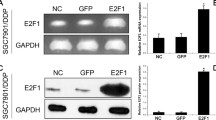Summary
To investigate the relationship between MDR1 and MDR3 gene and drug resistance to cisplatin of ovarian cancer cells. Two siRNAs (MDR1, MDR3) which specifically targeted MDR1 and MDR3 genes were transfered into A2780/DDP cells. Then double staining with Annexin-V-FITC/PI was used to detect cell apoptosis by the flow cytometry (FCM). A2780/DDP cell viability was determined by MTT. MDR1 and MDR3 mRNA were assessed by RT-PCR. Caspase-3 protein was detected by Western blotting. Transfection of MDR1 and MDR3 siRNA into A2780/DDP cells failed to reverse the drug-resistance of A2780/DDP cells to cisplatin (P>0.05). No significant difference in the apoptosis efficiency was observed between the MDR1 and MDR3 siRNA, pSuppressorNeo vector transfection cells and untreated cells (P>0.05). In the presence of cisplatin of different concentrations, the viability of A2780/DDP cells was not significantly decreased after the transfection. No changes in MDR1 and MDR3 mRNA were found in MDR1 and MDR3 siRNA-transfected A2780/DDP cells. As compared with pSuppressorNeo and untreated groups, no significant difference existed in the expression of MDR1 and MDR3 mRNA (P>0.05). The expression of caspase-3 protein in MDR1 and MDR3 siRNA transfected A2780/DDP cells was not significantly increased. It is concluded that multidrug resistance induced by cisplatin in ovarian carcinoma cell lines is not due to overexpression of MDR1 and MDR3 gene. The drug resistance of ovarian carcinoma cells to cisplatin is not mediated by P-glycoprotein.
Similar content being viewed by others
References
Krasznai Z T, Friedlander E, Nagy A et al. Quantitative and functional assay of MDR1/P170-mediated MDR in ascites cells of patients with ovarian cancer. Anticancer Res, 2005,25,1187–1192
Yoshimura N, Kudoh S, Mukohara T et al. Phase I/II study of cisplatin combined with weekly paclitaxel in patients with advanced non-small-cell lung cancer. Br J Cancer, 2004,90: 1184–1189
Hilary T, Coley H M. Overcoming multidrug resistance in Cancer: An Update on the Clinical Strategy of inhibiting P-Glycoprotein. Cancer Control, 2003,10(2):159–165
Bergman A M, Pinedo H M, Talianidis I. Increased sensitivity to gemcitabine of P-glycoprotein and multidrug resistance-associated protein-overexpressing human cancer cell lines. Br J Cancer, 2003,88(12):1963–1970
Inoue Y, Gika M, Abiko T et al. Bcl-2 overexpression enhances in vitro sensitivity against docetaxel in non-small cell lung cancer. Oncol Rep, 2005,13(2):259–264
Smith A J, van Helvoort A, van Meer G et al. MDR3 P-glycoprotein, a phosphatidylcholine translocase, transports several cytotoxic drugs and directly interacts with drugs as judged by interference with nucleotide trapping. J Biol Chem, 2000,275:23530–23539
Fesik S W. Promoting apoptosis as a strategy for cancer drug discovery. Nat Rev Cancer, 2005,5(11):876–885
Mantovani I, Cappellini A, Tazzari P L et al. Caspase-dependent cleavage of 170-kDa P-glycoprotein during apoptosis of human T-lymphoblastoid CEM cells. J Cell Physiol, 2006,207(3):836–844
Cheng T C, Manorek G, Samimi G et al. Identification of genes whose expression is associated with cisplatin resistance in human ovarian carcinoma cells. Cancer Chemother Pharmacol, 2006,58(3):384–395
Mozzetti S, Ferlini C, Concolino P et al. Class III β-tubulin overexpression is a prominent mechanism of paclitaxel resistance in ovarian cancer patients. Clin Cancer Res, 2005, 11(1):298–305
Author information
Authors and Affiliations
Rights and permissions
About this article
Cite this article
Ren, L., Xiao, L., Hu, J. et al. MDR1 and MDR3 genes and drug resistance to cisplatin of ovarian cancer cells. J. Huazhong Univ. Sci. Technol. [Med. Sci.] 27, 721–724 (2007). https://doi.org/10.1007/s11596-007-0627-7
Received:
Issue Date:
DOI: https://doi.org/10.1007/s11596-007-0627-7




